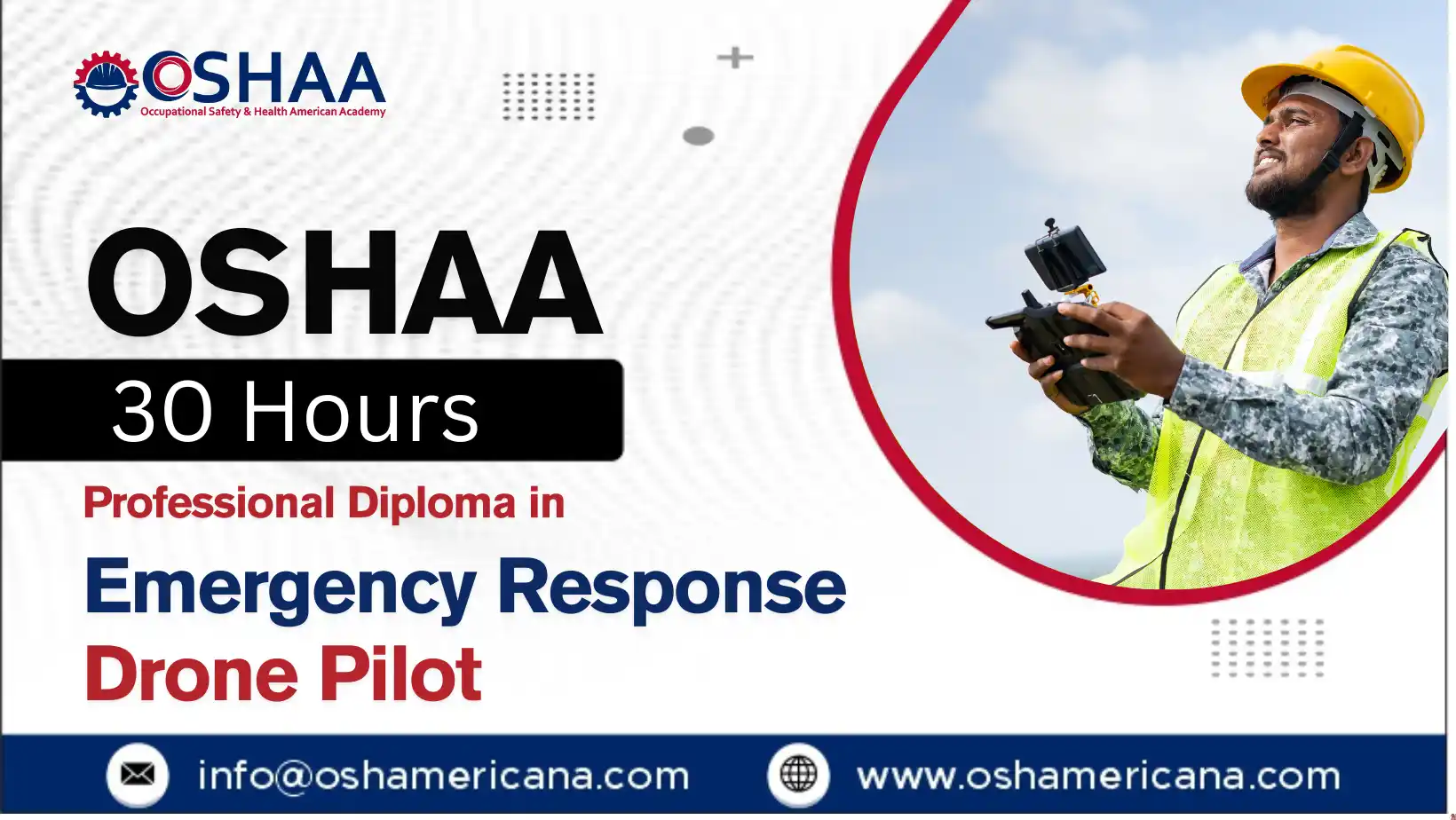Emergency Response Drone Pilot Diploma – OSHAA 30-Hours
The OSHAA 30-Hours Professional Diploma in Emergency Response Drone Pilot is a specialised training programme designed to equip participants with the critical skills and knowledge needed to operate drones effectively during emergency situations. As the awarding body, OSHAA ensures that this course adheres to the highest professional standards, preparing participants for the growing demand for drone technology in emergency response operations.
Participants in this diploma will gain a comprehensive understanding of drone technology, flight operations, and the specific applications of drones in emergency scenarios such as search and rescue, disaster assessment, and critical incident management. The course blends theoretical knowledge with practical training, allowing participants to develop proficiency in piloting drones safely and efficiently under challenging conditions.
The curriculum covers essential topics including drone flight regulations, safety protocols, mission planning, aerial imaging, data collection, and communication strategies during emergency deployments. Participants will also learn how to interpret aerial data and collaborate effectively with emergency response teams to enhance situational awareness and decision-making.
Upon completion, participants will be confident in their ability to deploy drones in various emergency contexts, contributing to faster response times and improved safety outcomes. This professional diploma is ideal for emergency responders, drone operators, public safety officials, and professionals looking to integrate cutting-edge technology into their emergency management practices.
By achieving the OSHAA 30-Hours Professional Diploma in Emergency Response Drone Pilot, participants demonstrate their commitment to advancing their skills and embracing innovative solutions in emergency response, positioning themselves for greater career opportunities in this dynamic field.
OSHAA 30-Hours Professional Diploma in Emergency Response Drone Pilot
Study Units
Learning Outcomes
Introduction to Emergency Response Drone Operations and Roles (3 Hours)
- Understand the role of drones in emergency response operations
- Identify key responsibilities of drone pilots within emergency teams
- Recognise the impact of drone technology on public safety and rescue efforts
Basics of Drone Technology and Components (3 Hours)
- Explain the fundamental components and functions of drones
- Understand different types of drones used in emergency contexts
- Demonstrate basic knowledge of drone system operations and maintenance
Drone Flight Regulations and Compliance (4 Hours)
- Understand relevant national and international drone flight regulations
- Comply with legal requirements and safety standards for drone operation
- Identify no-fly zones and restrictions applicable to emergency drone use
Pre-Flight Planning and Safety Protocols (3 Hours)
- Conduct thorough pre-flight checks and risk assessments
- Develop effective flight plans tailored to emergency response missions
- Implement safety protocols to mitigate operational risks
Drone Flight Techniques and Controls (4 Hours)
- Demonstrate proficient control of drones in various flight conditions
- Apply advanced manoeuvring and navigation skills during missions
- Handle emergency scenarios and unexpected flight challenges confidently
Aerial Imaging and Data Collection Methods (3 Hours)
- Operate drone-mounted cameras and sensors for data capture
- Apply best practices for aerial imaging in emergency environments
- Understand data collection techniques to support situational analysis
Emergency Response Applications and Mission Planning (4 Hours)
- Develop mission plans addressing specific emergency scenarios
- Integrate drone operations with broader emergency response strategies
- Adapt drone usage to diverse emergency contexts such as search and rescue or damage assessment
Communication and Coordination with Emergency Teams (4 Hours)
- Apply effective communication protocols with multi-disciplinary teams
- Coordinate drone operations to support emergency response efforts
- Facilitate information sharing and collaboration during missions
Data Analysis and Reporting for Emergency Situations (2 Hours)
- Analyse aerial data to generate actionable insights
- Prepare comprehensive reports for emergency response documentation
- Use data outputs to improve ongoing and future emergency operations
- Equips participants with specialised skills in operating drones for emergency response
- Enhances understanding of drone technology and its critical role in public safety
- Develops expertise in complying with drone regulations and safety protocols
- Improves participants’ ability to plan and execute drone missions effectively in emergencies
- Builds proficiency in advanced flight techniques and handling diverse operational conditions
- Trains participants to capture and analyse aerial data to support decision-making
- Strengthens communication and coordination skills with emergency response teams
- Prepares participants to contribute to faster, safer, and more efficient emergency operations
- Offers practical experience through simulations, boosting confidence and readiness
- Awards a recognised professional diploma that advances career prospects in emergency services and drone operations
- Participants working as emergency responders, rescue personnel, and public safety officials
- Professionals seeking to incorporate drone technology into emergency management
- Drone operators aiming to specialise in emergency response applications
- Search and rescue team members requiring advanced aerial support skills
- Disaster management coordinators and facility safety managers
- Trainers and instructors in drone piloting and emergency response disciplines
- Individuals pursuing career growth in the fields of drone technology and emergency services







